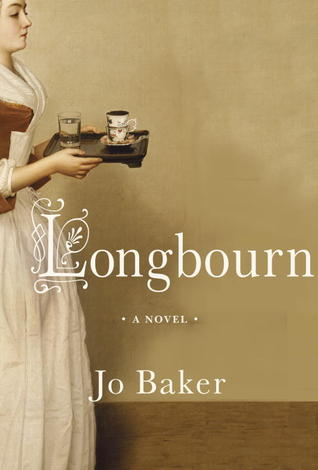 Title: Longbourn
Title: LongbournAuthor: Jo Baker
Publisher: Knopf
Published: October 2013
Read: March 2014
Where It Came From: Library
Genre: Historical Fiction
Rating: 2 Stars
The Quick and Dirty:
A young house servant in late Georgian England falls in love with a servant, whose mysterious past could leave both of them broken-hearted at the least. The book excels in making housework as dreary as it really is, and in making me appreciate the soap-opera plots of Downton Abbey. In short, it is dull though technically respectable.
The Wordy Version:
Despite my utter disappointment in Death Comes to Pemberley, I was excited about Longbourn. As Pride and Prejudice fanfiction goes, the concept behind Longbourn is actually unique: it’s a retelling of the story from the point of view of the servants in the shadows of the original novel. But a unique premise does not guarantee a uniquely enjoyable reading experience, and this book has fallen into many of the same pitfalls of writing as Death Comes to Pemberley.
The problem at its very center is that there is far too much realism. It’s like reading Strindberg’s Miss Julie without the psychological stuff. Pages go by of the servants washing laundry, slaughtering a pig, mucking the outhouse, making soap, sewing hems, trudging through the cold rain to purchase ribbons, etc. It gives the impression that the author has done a great deal of research on the day-to-day responsibilities of servants in early 19th century Britain, but that she hasn’t been able to concoct a plot worthy of pulling the characters away from the drudgery of their work.
There is some plot, of course. Longbourn’s maid-of-all-work, Sarah, is a pragmatic Belle from Beauty and the Beast: she goes about her daily chores practically singing about how there must be more than this provincial life, has her nose stuck in a book, and is so beautiful that from the moment that they meet her and see her, the footmen practically say she’s gorgeous (and make plans to woo and/or marry her). Sarah prickles at James, the new manservant at Longbourn, who has appeared in circumstances that convince her of his shady character. She is drawn to Netherfield’s footman, Ptolemy Bingley, who comes from the Bingley sugar plantations, and has dreams of owning his own tobacco shop in London. When the Bingleys head to London in accordance with the plot of Pride and Prejudice, Sarah wonders what is tying her to the Bennet household. (Spoiler—it’s the mysterious footman.)
Were this plot taking up the entire book, the love triangle might function to keep things moving. Instead Sarah becomes happily settled into her life for the next third of the book, and we have to cling to the vague plot possibility that Wickham is going to rape the child servant, Polly. And when that next part of the plot dissolves into the natural departure of Wickham from Longbourn, a further tenth of the book is spent developing a backstory to the mysterious James. Followed by some ennui in housework. And some moping about romantic separation.
I am floored that there are reviews on Goodreads saying Longbourn is a better or more complete book than Pride and Prejudice, or that it is a way to interest men in Austen. Nothing could be farther from the truth. Longbourn’s unfocused plot and overreliance on period detail mean that it is a plodding piece of prose. Generally the writing is formal and detached, with occasionally jarring mentions of shit when the style would be better suited to feces. The detachment here is entirely unlike Austen’s style, lacking humor and the appreciation of human absurdity (all of which I mention not as criticism of the book, but of reviews that make the mistaken comparison). I observed some interesting diction and the sentences were fine, but without much of a story to tell, the only thing compelling me to finish was the desire to knock off another reading Bingo square for the year (“a published fanfic”).
As for any suggestion that Pride and Prejudice is incomplete without looking at the servants responsible for everyone’s food and laundry? The reason Pride and Prejudice doesn’t talk about the lives of Longbourn’s servants is precisely the reason this book is boring to read: nobody cares about dishwashing, and chores are irrelevant to the plot of Elizabeth maturing in her judgment and falling in love with Darcy. Unless Pride and Prejudice had a major moment of Darcy looking at some tarnished piece of silver in Longbourn, and insulting Elizabeth for her servants’ neglect, the individual lives of the servants do not affect the plot of Austen’s book. To a large extent, the opposite is naturally true as well. The servants do not care all that much about Mr. Wickham’s unscrupulousness or the Bingleys’ abrupt departure from Netherfield.
With little important convergence in the plots of Longbourn and Pride and Prejudice, it’s probably unfair to judge Longbourn for not bringing much new understanding to its source material. In essence, Longbourn would have been the same if the “upstairs” family were any other family: illuminative about the lives of a largely marginalized class of people, but overly concerned with housework, and entirely too long.







No comments:
Post a Comment